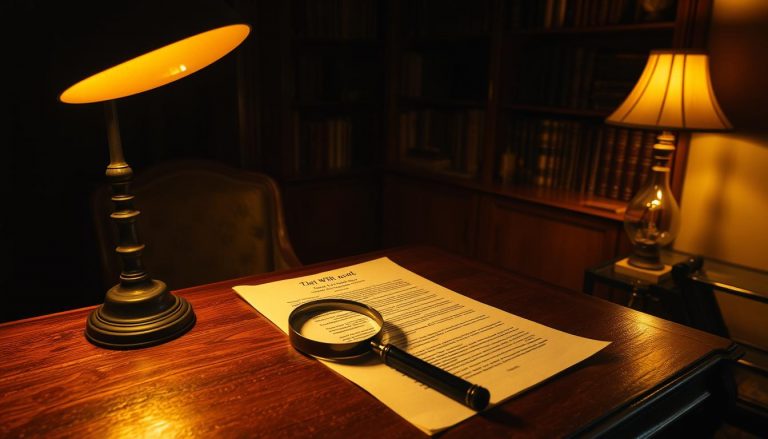Locating the will of a deceased person is a crucial step in settling their estate. We understand that this task can be challenging, but with the right guidance, you can navigate the process efficiently.
According to the UK government, if the deceased person passed away after 1857, you can search for their probate record online. This information can be a valuable starting point in your search for the will.
We will guide you through the various channels to search for a will, ensuring that you have a clear understanding of the steps involved. Our aim is to provide you with the necessary tools to locate the will and settle the estate with ease.
Key Takeaways
- Search for probate records online if the person died after 1857.
- Understand the different channels to locate a deceased person’s will.
- Settle the estate efficiently with the right guidance.
- Utilise online resources to simplify the search process.
- Ensure a clear understanding of the steps involved in locating a will.
Understanding the Basics of Wills
Grasping the basics of wills is essential for anyone looking to navigate the complexities of estate distribution after a loss. A will is a fundamental document that ensures a person’s estate is handled according to their wishes.
What is a Will?
A will, or last will and testament, is a legal document that outlines how a person’s estate should be distributed after their death. It includes details about the distribution of assets, guardianship for minors, and even funeral wishes. Having a will simplifies the process for loved ones during a difficult time.
Importance of Having a Will
Having a will is crucial as it ensures that a person’s wishes are respected and carried out. Without a will, the estate is distributed according to the laws of intestacy, which may not align with the deceased’s intentions. A will also helps in reducing potential conflicts among beneficiaries.
Key benefits of having a will include:
- Ensuring your assets are distributed as you wish
- Appointing guardians for minor children
- Reducing the burden on your loved ones
- Minimizing potential disputes among family members
Types of Wills in the UK
The UK recognizes various types of wills, catering to different needs and circumstances. These include:
- Simple Wills: Basic documents that outline the distribution of assets.
- Complex Wills: Involve more intricate details, such as trusts for beneficiaries.
- Living Wills: Outline a person’s wishes regarding medical treatment in scenarios where they are unable to communicate.
For more detailed information on the probate process, you can visit this resource, which provides insights into handling estates.
Where to Start Your Search
When a loved one passes away, locating their will is a priority for many families in the UK. The initial steps can be challenging, but by following a systematic approach, you can increase the chances of finding the will.
Check with Family Members
One of the first steps is to have an open conversation with family members. They may be aware of the will’s existence or even have a copy. It’s not uncommon for family members to be named as executors or beneficiaries, so their insight can be invaluable.
Visit the Deceased’s Home
Conducting a thorough search of the deceased’s home is another crucial step. Look for documents in obvious places such as filing cabinets, desks, or safes. Sometimes, wills are stored with other important documents like property deeds or insurance policies.
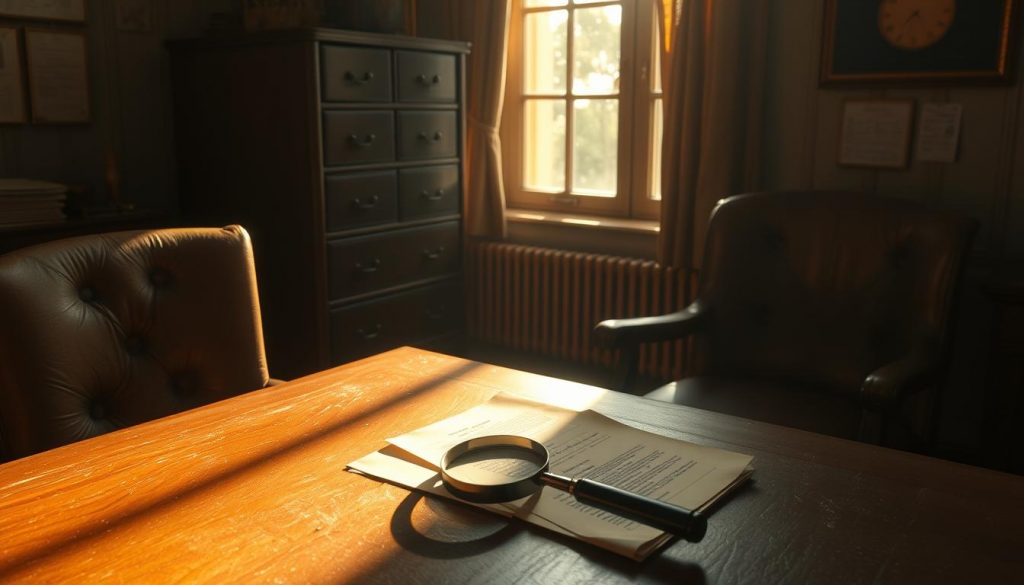
Contacting Solicitors or Legal Advisors
If the deceased used the services of a solicitor or legal advisor, it’s worth contacting them. These professionals often keep copies of wills and other legal documents. They can provide guidance on how to proceed with the estate administration.
| Search Location | Potential Documents | Tips |
|---|---|---|
| Family Members | Copies of the will, executor details | Have an open conversation, ask about their knowledge |
| Deceased’s Home | Wills, property deeds, insurance policies | Search thoroughly, check filing cabinets, safes |
| Solicitors/Legal Advisors | Copies of wills, legal documents | Contact them, provide necessary details |
By checking with family members, visiting the deceased’s home, and contacting solicitors or legal advisors, you can cover the initial groundwork necessary for discovering a deceased person’s will. These steps are fundamental in ensuring that you are thorough in your search.
Searching Through Official Channels
When personal searches yield nothing, it’s time to explore official channels to locate a deceased loved one’s will. This step can be crucial in ensuring that the estate is handled according to the deceased’s wishes.
The Probate Registry
The Probate Registry is a government agency responsible for the administration of estates. To search for a lost will of a deceased, you can contact the Probate Registry directly or search for a probate record online. This can be a valuable resource when trying to locate a will of a deceased loved one.
To initiate a search, you will need to provide the deceased’s name and date of death. The Probate Registry can then inform you if a grant of probate has been issued and provide details on how to obtain a copy of the will, if one exists.
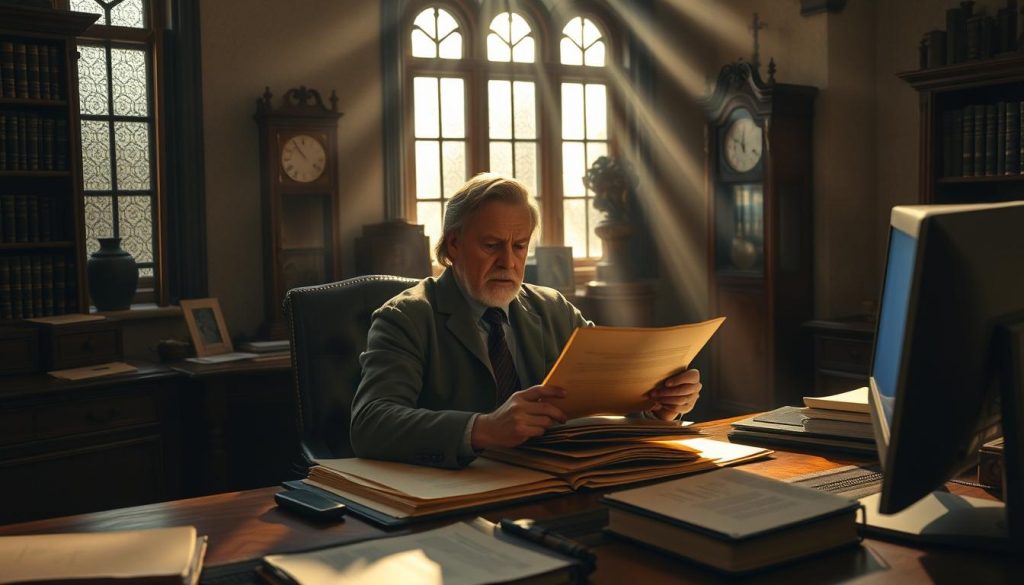
Online Will Search Services
In addition to the Probate Registry, online will search services can be a helpful tool. Services like the National Will Register allow you to search for a will by providing the deceased’s details. These services can be particularly useful if you’re unsure which solicitor or law firm might hold the will.
It’s worth noting that some of these services may require a fee, and it’s essential to understand their terms and conditions before proceeding. For more information on the probate process, you can visit our page on how to find out if probate has been.
By utilizing both the Probate Registry and online will search services, you can comprehensively search for a lost will of a deceased and ensure that you’re taking all necessary steps to locate a will of a deceased loved one.
Locating Wills through Local Authorities
In the UK, local authorities play a significant role in helping you locate a deceased person’s will. When a person passes away, various local entities may hold information about their will. Understanding where to look and who to contact can simplify the process.
County Courts
County courts are a crucial starting point in your search. These courts often keep records of wills, especially if the deceased’s estate went through probate. To find the relevant county court, you can:
- Visit the UK Government’s website to find the appropriate court based on the deceased’s location.
- Contact the court directly to inquire about their procedure for searching will records.
- Be prepared to provide necessary details such as the deceased’s name and date of death.
Local Solicitor Firms
Local solicitor firms are another valuable resource. Solicitors often handle wills and probate matters, so they may have information or records of the deceased’s will. To approach local solicitor firms:
- Identify firms in the area where the deceased lived or owned property.
- Contact them to ask if they handled the will or know who did.
- Be prepared to provide identification and your relationship to the deceased.
When searching through local authorities, it’s essential to be thorough and persistent. Keep detailed records of your inquiries, including dates, names of people you spoke with, and any information provided.
By leveraging local resources such as county courts and solicitor firms, you can increase your chances of finding the will you’re looking for. Remember, the key is to be systematic and thorough in your search.
Engaging Professional Help
If you’re struggling to find the will or need guidance on the process, consider engaging professional help. A solicitor can provide expert advice and guidance on the legal aspects of finding and administering a will.
When to Hire a Solicitor
You may need to hire a solicitor if you’re unable to locate the will or if the will is complex. This is particularly important if there are disputes among family members or beneficiaries. A solicitor can help navigate these complexities and ensure that the deceased’s wishes are respected.
Some scenarios where hiring a solicitor is advisable include:
- When the will is difficult to locate or appears to be missing.
- If there are multiple wills, and it’s unclear which one is the most recent or valid.
- In cases of disputes among beneficiaries or family members.
Benefits of Professional Guidance
Engaging a solicitor can provide several benefits, including:
| Benefit | Description |
|---|---|
| Expert Knowledge | Solicitors have in-depth knowledge of the legal requirements and processes involved in will administration. |
| Reduced Stress | By handling the legal aspects, solicitors can significantly reduce the stress on the family during a difficult time. |
| Ensured Compliance | Solicitors ensure that all legal procedures are followed correctly, minimizing the risk of errors or disputes. |
By hiring a solicitor, you can ensure that the process of locating and administering the will is handled efficiently and effectively, allowing you to focus on supporting your family during this challenging period.
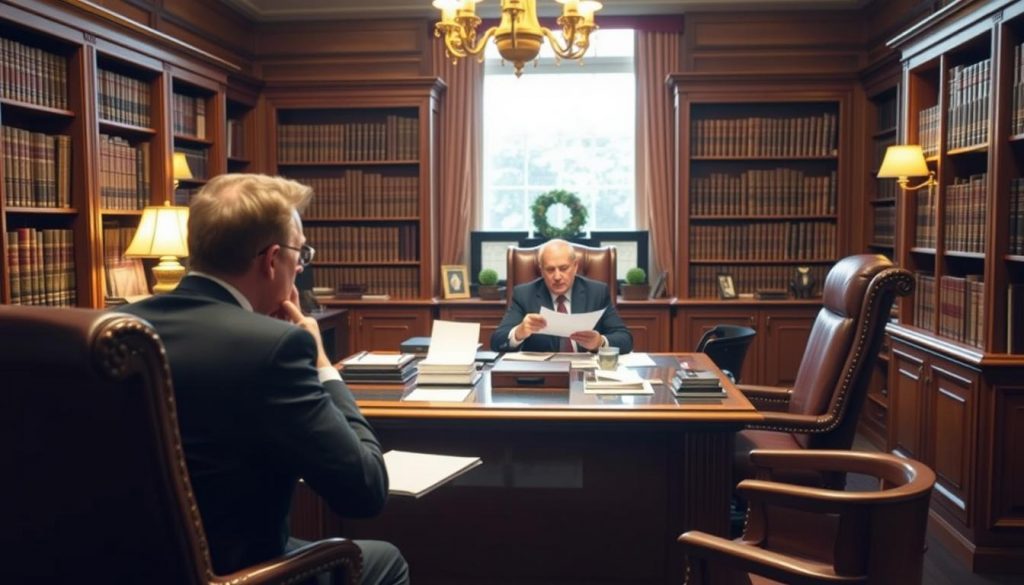
Understanding the Role of Probate
When a loved one passes away, understanding the legal processes surrounding their estate can be overwhelming, but knowing about probate is a crucial starting point. Probate is an essential part of administering a deceased person’s estate, and it’s vital to comprehend its role.
Probate is the legal process that verifies a will and grants permission to administer the estate according to the deceased’s wishes. This process ensures that the estate is distributed correctly and that all legal obligations are met.
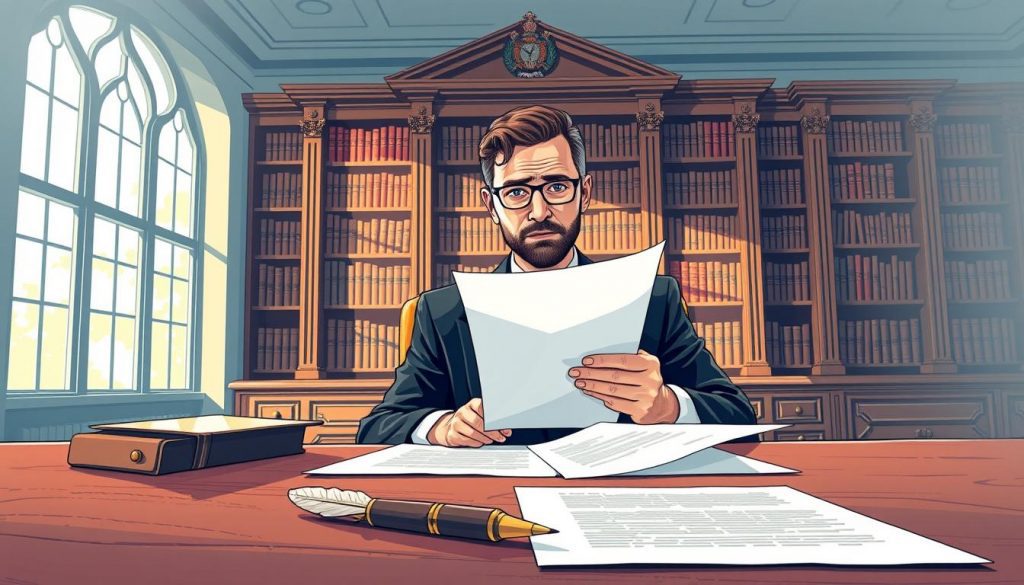
What is Probate?
Probate involves verifying the authenticity of the will and ensuring that it is valid. This process is typically carried out by the Probate Registry. The registry checks for any issues with the will, such as disputes or potential challenges, before granting probate.
Once probate is granted, the executor named in the will can proceed with administering the estate. This includes gathering in the deceased’s assets, paying off debts, and distributing the remaining assets according to the will.
How It Relates to Wills
Probate is directly related to wills because it is the process that gives legal effect to the instructions contained in the will. Without probate, the executor cannot legally carry out the deceased’s wishes as stated in the will.
Understanding probate is crucial when searching for a will because it highlights the importance of locating the original will. The original will is required for probate, so finding it is a priority when administering the estate.
By grasping the role of probate, individuals can better navigate the complex process of dealing with a deceased loved one’s estate, ensuring that their wishes are respected and their estate is administered correctly.
Searching Online for Wills
Searching for a will online requires a strategic approach. With the vast amount of information available on the internet, it can be daunting to know where to start. However, by utilizing the right online resources and being aware of their limitations, you can effectively locate a will.
Websites to Consider
Several websites offer will search services. These include:
- The National Will Register, which provides a comprehensive database of registered wills.
- Local authority websites, which may hold records of wills and probate.
- Specialized genealogy websites, which can be useful if you’re tracing a more distant relative.
When using these services, it’s essential to understand their coverage and any associated costs.
Cautions When Using Online Services
While online will search services can be incredibly useful, there are several cautions to consider:
- Verify the authenticity of the information found online.
- Be aware of potential scams or fraudulent services.
- Understand the terms and conditions of the service, including any fees.
It’s also crucial to note that not all wills are registered online, so a negative search result doesn’t necessarily mean the will doesn’t exist.
Here’s a comparison of some popular online will search services:
| Service | Coverage | Cost |
|---|---|---|
| National Will Register | UK-wide will registrations | £X – £Y per search |
| Local Authority Websites | Varies by authority | Free – £X per search |
| Genealogy Websites | Global records, including UK | Subscription-based, £X – £Y per month |
Investigating Personal Records
To find a will, it’s necessary to thoroughly investigate the deceased’s personal and financial documents. This step can provide crucial clues about the will’s existence or location.
Bank Statements and Financial Documents
Start by gathering bank statements and financial documents belonging to the deceased. These records can sometimes contain references to the will or the solicitor handling it.
- Check for any payments made to solicitors or law firms.
- Look for unusual or large transactions that might be related to estate planning.
- Verify if there are any safe deposit box rentals or related transactions.
Digital Accounts and Services
In today’s digital age, many personal records are stored online. Investigating the deceased’s digital footprint can yield important information.
Key areas to focus on:
- Email accounts for communications with solicitors or financial advisors.
- Online banking and financial services for any relevant transactions.
- Cloud storage services where documents might be stored.
When accessing these digital accounts, ensure you have the necessary permissions or legal authority to do so.
Considering Unconventional Legal Documents
The search for a will can sometimes lead to unexpected places, including unconventional legal documents that serve as alternatives to traditional wills. When trying to locate a will after death, it’s crucial to consider all possible documents that could provide insight into the deceased’s estate plans.
Types of Informal Wills
While traditional wills are the norm, there are instances where informal wills can be valid. These can include:
- Handwritten notes or letters that express the deceased’s wishes regarding their estate.
- Documents written on unconventional materials, such as scraps of paper or even digital notes on a phone.
- Oral statements made in the presence of witnesses, although these can be challenging to verify.
It’s essential to understand that the validity of these informal wills can vary depending on the circumstances and the laws of the jurisdiction.
Digging into Living Trusts
Living trusts are another legal document that can play a significant role in estate planning. A living trust allows the deceased to distribute their assets without the need for probate, offering a level of privacy and potentially reducing legal complications.
Key aspects of living trusts include:
- The ability to manage and distribute assets during the creator’s lifetime and after their passing.
- Avoiding probate, which can be a lengthy and costly process.
- Maintaining privacy, as living trusts are not public records like wills that go through probate.
When searching for a deceased person’s will, it’s worth investigating whether they had established a living trust, as this could significantly impact how their estate is handled.
Handling Found Wills
After finding a will, understanding its validity and the subsequent legal procedures is essential. This step is crucial in ensuring that the deceased’s estate is administered correctly and that all legal obligations are met.
What to Do Once You Find a Will
Upon locating a will, the first step is to verify its authenticity. This involves checking for any signs of tampering or alterations and confirming that it is the most recent version. We recommend:
- Carefully examining the document for any signs of alteration or damage.
- Checking if the will is signed and witnessed correctly according to UK law.
- Confirming that it is the latest version by checking the date and any references to previous wills.
For more detailed guidance on obtaining a copy of a will, you can visit LegalZoom for additional resources.
Understanding Its Validity
Understanding the validity of a will involves several key factors. These include the mental capacity of the deceased at the time of writing the will, the presence of undue influence, and whether the will was properly executed. A valid will must be in writing, signed by the testator, and witnessed by two independent individuals.
| Criteria | Description | Importance |
|---|---|---|
| Mental Capacity | The testator must have been of sound mind when making the will. | High |
| Undue Influence | The will must not have been made under pressure or coercion. | High |
| Proper Execution | The will must be signed and witnessed according to legal requirements. | Critical |
By carefully evaluating these factors, we can ensure that the will is valid and that the deceased’s wishes are respected. If you’re unsure about any aspect of the will’s validity, seeking professional legal advice is advisable.
Legal Obligations After Discovering a Will
Discovering a will is just the beginning; there are important legal obligations to fulfill. Once you’ve found a will, you’ll need to navigate certain legal requirements to ensure that the deceased’s estate is handled according to their wishes.
Reporting the Will to the Probate Registry
After locating a will, one of the primary legal obligations is to report it to the Probate Registry. The Probate Registry is responsible for handling the administration of the deceased’s estate, ensuring that the will is valid, and that the estate is distributed according to the will’s instructions.
To report the will, you’ll need to:
- Obtain the original will and any relevant codicils.
- Gather necessary documents, including the death certificate.
- Fill out the appropriate application form for probate.
- Submit the application and supporting documents to the Probate Registry.
It’s essential to ensure that all documents are accurate and complete to avoid any delays in the probate process.
Responsibilities of the Executor
The executor named in the will has several key responsibilities. They are tasked with administering the estate according to the instructions outlined in the will. This includes:
| Responsibility | Description |
|---|---|
| Managing the Estate | The executor must gather in the assets of the estate, pay any debts, and distribute the remaining assets according to the will. |
| Notifying Beneficiaries | The executor should inform all beneficiaries named in the will of their inheritance. |
| Dealing with Tax | The executor is responsible for handling any tax liabilities of the estate, including income tax and inheritance tax. |
It’s crucial for the executor to keep detailed records of all transactions related to the estate administration.
By understanding and fulfilling these legal obligations, you can ensure that the deceased’s wishes are respected and that the estate is administered correctly.
Frequently Asked Questions About Finding Wills
When searching for a will, several questions often arise. Understanding the process and being aware of common pitfalls can significantly ease the task of locating a deceased person’s will.
Misconceptions About Wills
One common misconception is that a will is always stored in a specific, easily accessible location. In reality, wills can be kept anywhere, such as with a solicitor, at a bank, or even at the deceased’s home. Knowing how to find a will of a deceased person involves checking various potential locations and sources.
Tips for a Successful Search
To locate a deceased person’s will efficiently, consider the following tips: Start by asking family members or the deceased’s solicitor if they know where the will is kept. Check the deceased’s home, safety deposit boxes, and contact the Probate Registry. Using online will search services can also be beneficial, but be cautious of potential fees and ensure you’re using reputable services.
By following these steps and understanding the process, you can ensure a successful search for the will, helping to protect the deceased’s wishes and facilitate the administration of their estate.


